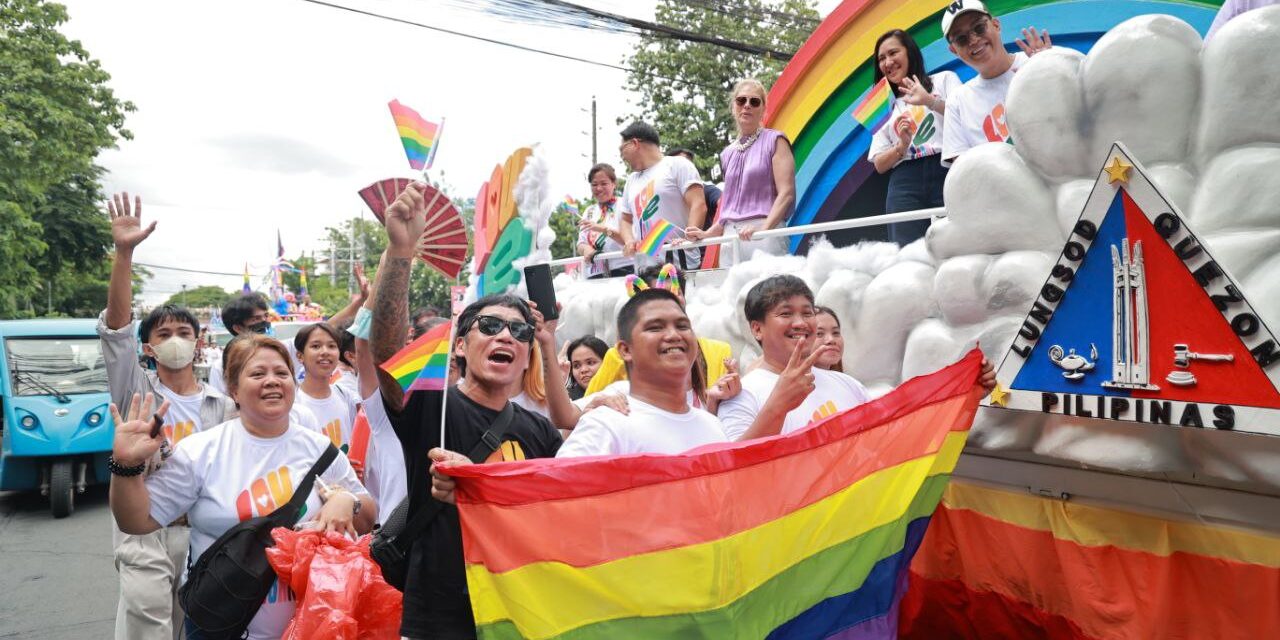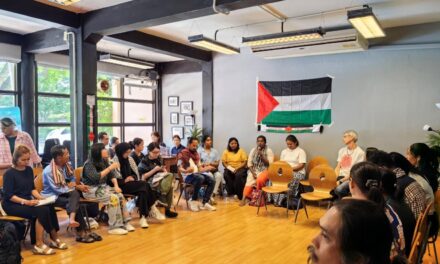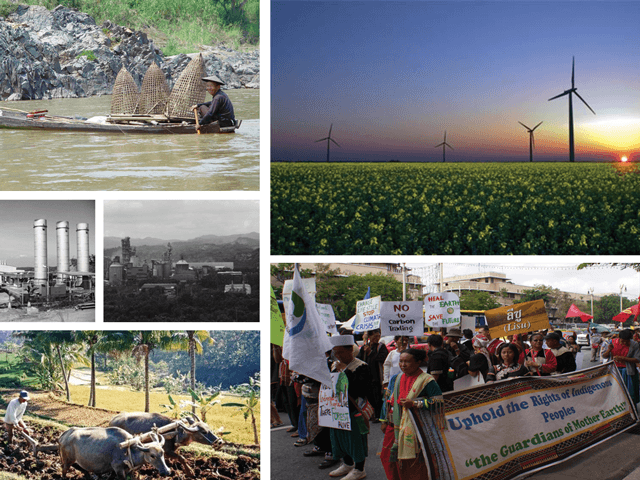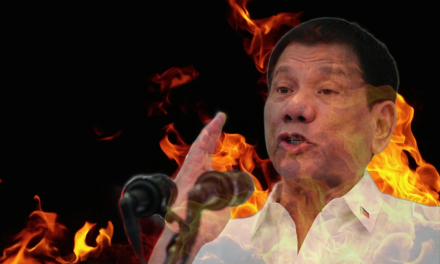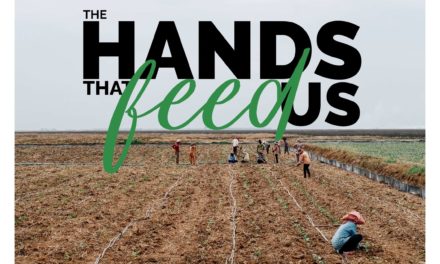We asked two of Focus allies in the Philippines–Jhay de Jesus of True Colors Coalition and National Coordinator of the broad human rights movement, IDEFEND, and Judy Ann Miranda of Partido Manggawa–about their participation in this year’s actions, key messages and demands articulated in the mobilizations, and how they view the struggle for gender rights in relation to the broader fight for social justice and human rights.
Both Jhay and Judy recalled the beginnings of Pride March 53 years ago, tracing the first ever marches across the United States in the summer of 1970, organized to commemorate the Stonewall Uprising a year before, which had become a catalyst for gay rights movement in the US and around the world. Both Jhay and Judy emphasized the importance of what has become an annual gathering under the banner of Pride, not only as spaces to celebrate unity and the strides that have been made as a movement pushing for recognition of gender rights, but as moments to protest continuing discrimination and gender-based violence and demand action to remove barriers to gender equality.
In an article published in Rappler, Ging Cristobal of Outright International, identified these barriers as strong anti-LGBTQIA resistance and misinformation campaign resulting from monolithic views of cultures and traditions which are used to dictate governments’ , the lack of anti-discrimination laws, the persistence of unethical conversion or reparative practices, as well as continuing criminalization of same sex acts between consenting adults. Cristobal adds that as of 2023, same-sex sexual acts between consenting adults are still criminalized in 64 countries, 22 of which are in Asia.
Focus Dispatch: What is the significance of the PRIDE march for you?
Jhay de Jesus: These Pride marches signify our commitment to unite and forge on with the struggle to end the many violations done to our community.
Judy Ann Miranda: Marching on this day gives me and Partido Manggagawa (PM) the opportunity to integrate the workers movement with the LGBTQIA+ community in the fight against capitalist exploitation.
Focus Dispatch: How long have you been joining the events? And how is your participation this year different from previous years?
Jhay: I have been joining marches and Pride-related events since college. From actual marches to after-parties and even joining white and black parties in Malate before, it’s been discontinued years ago since most of the well-known queer bars in the area have either closed or transferred to a different city. This year, I participated in the Kahilwayan Pride of Northern Mindanao, and facilitated the drafting the statement of the pride event with the help of members of the core group.
Judy: PM has joined Pride activities almost a decade now. This year we march with our youth arm, PM Kabataan, organized students, working students, young workers and our Ina ng Bayan women leaders. We also joined as members of the newly organized Women Workers United In partnership with the International Labor Organization (ILO) – Manila.
Focus Dispatch: Did your group bring any specific message or highlight a specific demand or call this year?
Jhay: True Colors Coalition released a statement for pride month and did media interviews as a projection of our highlighted issues for this year’s commemoration.
This year’s calls and themes still revolved around the call for the end of discrimination and violence against the community. We also highlighted the call for accountability of stakeholders – for the government to enact an anti-discrimination law that will protect the community and ensure justice for victims (of gender discrimination and violence). We also highlighted the experiences of many LGBTQIA+ people to provide a situationer to other members of the community and the public in general. We hope that the sharing of experiences of discrimination and violence will help in deepening the understanding of the plight of the community and make more people join the call for justice and equality.
Judy: PM highlighted the calls for the passage of the SOGIESC (sexual orientations, gender identities, gender expressions and sex characteristics) bill and of a legislated nationwide across the board wage increase of P150 pesos. We likewise called for the ratification of ILO C190, a convention that aims to end harassment and violence in the world of work.
We carried the slogan: Sahod (wages), Trabaho (jobs), Pampublikong Serbisyo (public services) at Karapatan (human rights).
Focus Dispatch: What are the continuing challenges faced by the LGBTQI community in the Philippines?
Jhay: The major challenge still is the issue of discrimination and violence. We think that this is rooted in the lack of knowledge and understanding of the public about the concepts of SOGIESC and the lives of every LGBTQIA+ individual. Also, the lack of government support for the community in ensuring the protection and recognition of the community’s role and place in society. The community’s contribution to society remains invisible while we are continuously viewed as perpetrators, nuisance, and an abomination.
Judy: Capitalism and neo liberal policies oppress and abuse the LGBTQIA+ community through its cheap labor policy, contractual work and exploitative working conditions. The LGBTQIA+ community is part of this exploitation. They are vulnerable to economic deprivation from discriminatory hiring policies, stereotyped on work opportunities ,lack of training and decent jobs. Disadvantaged from access to education social protection and political freedoms.
Focus Dispatch: How do you see the LGBTQI+ community contributing to grassroots struggles and to the larger social movements for social change at the national and international levels?
Judy: Individual and collective struggles against discrimination, sexual abuses, social protection, economic, political and socio cultural rights are all contributory to the bigger struggle for a life of dignity for all. The organizing work in communities, formation of associations and unions, awareness raising and education, campaigns at the grassroots paves the way for the fight for a just and humane society.
LGBTQIA+ community is part and parcel of the exploited working class. Their voices, their participation and integration in the working class struggles in the Philippines and worldwide is crucial in achieving labor dignity.
Ang laban ng LGBTQIA+ ay laban ng Manggagawa. Ang laban ng Manggagawa ay laban ng LGBTQIA+ community (The struggle of LGBTQIA+ is the struggle of workers. The struggle of workers is the struggle of LGBTQIA+ community.)
Jhay: Our sector is a cross-cutting sector, while we are members of our community, we are also part of different sectors in society. We are teachers, youth, women, workers, etc, and by being part of other sectors, we are not spared in experiencing the plight of other sectors. By joining the struggle of other sectors and pursuing our specific community struggle, we can contribute to the general struggle of the people. One good example was during the 2019 Metro Manila Pride March where the community joined the call to boycott NutriAsia products in support of the labor issue. The community is very active in engaging with social movements here and around the world. We have a great history of joining the people’s struggle. From joining and initiating workers’ unions to bringing calls for support to citizens of other countries (one good example was during the youth uprisings from different countries, LGBTQIA+ groups joined their calls; there are also LGBTQIA+ advocates who did solidarity campaign calls with the people of Myanmar), to participating in international mechanisms like UNHRC and UPR sessions to bring our community’s and other sector’s situation to the world.
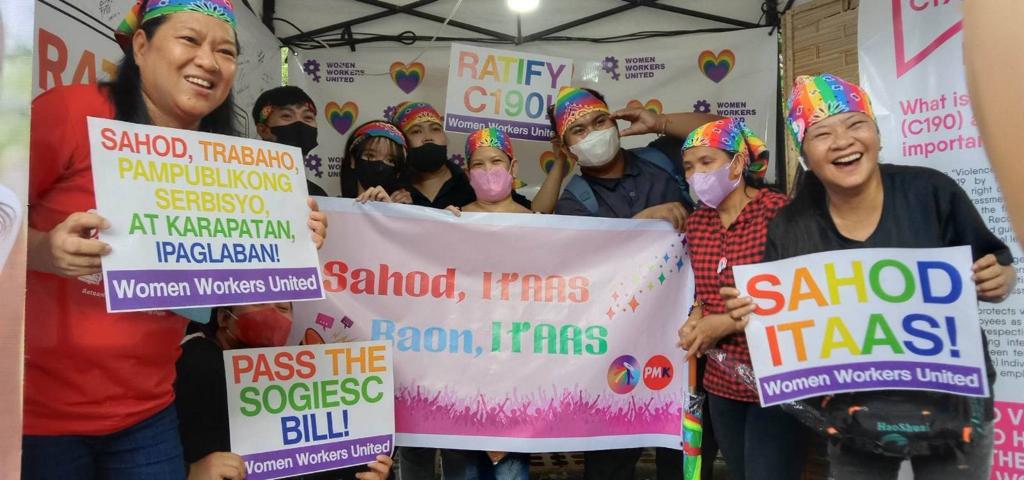
Caption: Women workers join Pride Month celebrations. Amplifying calls for legislated wage increase and the passage of law on SOGIEC equality. June 2023. Photo courtesy of Partido Manggagawa.
Focus Dispatch: Are there policies that the community is pushing in Congress? What is the status of the campaigns for these policies?
Jhay: The SOGIESC Equality Bill aims to protect members of the community against discrimination and violence. It has been a long struggle for the community and until now, it has not passed as a law. Currently, the committee was able to approve the bill, but we think it will still be a long way before it can be a law. The Senate has not yet continued to talk about it. Though, in localities, there are existing anti-discrimination ordinances (some of which don’t have IRRs), we think these can be a good step in achieving a national-level law. We now also have the program from the QC LGU for a right-to-care card where LGBTQIA+ couples can exercise their right to decide for their partners in cases of hospitalization and health-related situations, this is a good point to continue talking about the experiences of many LGBTQIA+ couples and may pave the way to win the struggle for marriage equality so we can enjoy the same rights as heterosexual couples enjoy.
Judy: Aside from supporting the SOGIESC bill, Partido Manggagawa is also pushing for a legislated wage increase, and policies on security of tenure, and the Magna Carta for Workers in the Informal Economy.
All these bills would ensure economic stability, job security and social protection of the LGBTQIA+ community. These are basic rights to ensure a life of dignity for our LGBTQIA+ community and their families.
Status of SOGIESC Legislation
The push for SOGIE Equality (and Anti-Discrimonation) legislation has been a decades long struggle. With proposals in Congress dating back to the year 2000, the bills have languisihed in both houses of Congress, failing to get pass the committee level in the legislative process. In the Senate, Senate Bill 1600 has been pending second reading since December 2022 and has recently been remanded to the Committee on Rules for further study. Several bills prohibiting discrimination on the basis of sexual orientation or gender Identity or expression are likewise pending at the committee level in the lower House.
While there have been growing support for the enactment of the law, the proposals have also been met by strong opposition from religious groups and advocates of parents rights claiming that the bill would impose “progressive beliefs on others who did not share them”.

